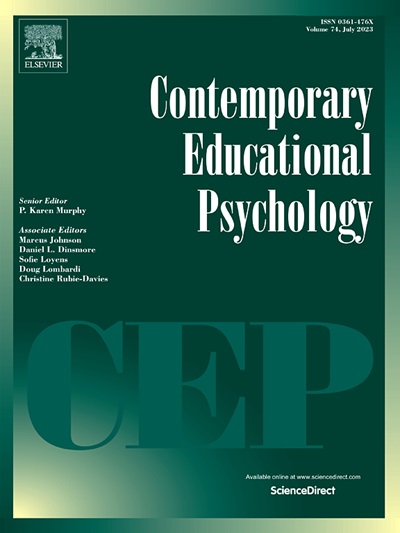The storage component of working memory mediates the relationship between mathematical anxiety and arithmetic performance
IF 3.8
1区 心理学
Q1 PSYCHOLOGY, EDUCATIONAL
引用次数: 0
Abstract
Mathematical anxiety is negatively associated with mathematics performance. Previous studies have demonstrated that working memory mediates this relationship. Although there are many theories on working memory, most agree that working memory includes a storage component (i.e., short-term memory). However, little is known about the role of short-term memory in the relationship between mathematical anxiety and mathematics performance. In this study, we investigated whether short-term memory mediates the relationship between mathematical anxiety and arithmetic performance. The participants were 178 children aged 8–10 years. They were asked to complete mathematical and trait anxiety questionnaires and a battery of cognitive tests to measure exact arithmetic and arithmetic estimation abilities, working memory, and short-term memory. We found that after controlling for trait anxiety, age, and gender, the relationship between mathematical anxiety and exact arithmetic ability was mediated by the storage but not by the executive component of working memory. In addition, the mediating effect was influenced by the type and difficulty of arithmetic tasks. These findings suggest that mathematical anxiety impairs arithmetic performance through the storage component of working memory. The results suggest that educators should pay more attention to the role of short-term memory in mathematics teaching.
工作记忆的储存成分在数学焦虑与算术成绩之间起中介作用
数学焦虑与数学成绩呈负相关。先前的研究已经证明,工作记忆介导了这种关系。虽然有很多关于工作记忆的理论,但大多数人都认为工作记忆包括存储部分(即短期记忆)。然而,人们对短期记忆在数学焦虑和数学成绩之间的关系中所起的作用知之甚少。在本研究中,我们探讨了短期记忆是否在数学焦虑和算术成绩之间起中介作用。参与者是178名8-10岁的儿童。他们被要求完成数学和特质焦虑问卷,以及一系列认知测试,以衡量精确算术和算术估计能力、工作记忆和短期记忆。我们发现,在控制特质焦虑、年龄和性别后,数学焦虑与精确算术能力的关系是由工作记忆的储存部分介导的,而不是由工作记忆的执行部分介导的。此外,算术任务的类型和难度对中介效应也有影响。这些发现表明,数学焦虑通过工作记忆的存储部分损害算术表现。研究结果提示教育工作者应重视短期记忆在数学教学中的作用。
本文章由计算机程序翻译,如有差异,请以英文原文为准。
求助全文
约1分钟内获得全文
求助全文
来源期刊

Contemporary Educational Psychology
PSYCHOLOGY, EDUCATIONAL-
CiteScore
16.50
自引率
3.90%
发文量
74
期刊介绍:
Contemporary Educational Psychology is a scholarly journal that publishes empirical research from various parts of the world. The research aims to substantially advance, extend, or re-envision the ongoing discourse in educational psychology research and practice. To be considered for publication, manuscripts must be well-grounded in a comprehensive theoretical and empirical framework. This framework should raise critical and timely questions that educational psychology currently faces. Additionally, the questions asked should be closely related to the chosen methodological approach, and the authors should provide actionable implications for education research and practice. The journal seeks to publish manuscripts that offer cutting-edge theoretical and methodological perspectives on critical and timely education questions.
The journal is abstracted and indexed in various databases, including Contents Pages in Education, Australian Educational Index, Current Contents, EBSCOhost, Education Index, ERA, PsycINFO, Sociology of Education Abstracts, PubMed/Medline, BIOSIS Previews, and others.
 求助内容:
求助内容: 应助结果提醒方式:
应助结果提醒方式:


